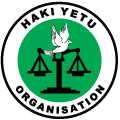We spend many of our waking hours and adult lives at work. Many factors influence the mental health of employees at the office. Workplace issues including poor communication, management practices, limited participation in decision-making, long or inflexible working hours and lack of team cohesion may cause a significant tumble in the wellbeing of employees at the expense of their mental health. Working environments where rapid, life-saving decisions need to be made, or where staff are frontline workers handling cases of traumatized victims come with their own psychological and emotional challenges.
Haki Yetu seeks to create a safe space and a holistically friendly work environment within the organization. The aim is to ensure that every employee’s voice and needs are heard and addressed, which is why the provision of mental health and psychosocial support (MHPSS) to our staff is one of our priorities.

Mental health encompasses emotional, psychological, and social well-being. It influences cognition, perception and behaviour. It is a determinant in how an individual handles stress, interpersonal relationships and decision-making. Psychosocial support then refers to the support given to help meet the mental, emotional, social and spiritual needs of individuals and their families. Activities surrounding MHPSS should be integrated into health, justice, education, social services and other sectoral initiatives that address Human Rights.
Being employed is good for one’s psyche, but a negative working environment can lead to serious physical and mental health problems. Haki Yetu acknowledges that the mental well-being of employees has a significant impact on their health, professional fulfilment and quality of life. It also leads to increased productivity and organizational success. Research shows that nearly 86 percent of employees treated for depression report improved work performance. And in some studies, treatment of depression has been shown to reduce absenteeism and presenteeism by 40 to 60 percent. We reckon that mental health and psychosocial support at workplace increases retention: In 2019, 59 percent of employees who left their job employment and work said mental health was the primary reason. The World Health Organization (WHO) estimates that depression and anxiety cost the global economy $1 trillion per year in lost productivity. Recently, many employers are enhancing emotional and mental health benefits.
At Haki Yetu, our journey to attaining and maintaining good mental health commenced by incorporating individual and group counselling in our work.

It is important for employers as well as colleagues to be trained on MHPSS, so they are able to recognize the signs of emotional distress early and can react in a supportive rather than a punitive or stigmatizing way whenever it occurs. Once an organisation has fully grasped the concept and the impact mental health has on its ability to achieve results, offering services to foster the psychosocial wellbeing of its staff is not only logical from a management perspective, but also goes a long way in showing appreciation for the work of its employees.
Encouraging open conversations on emotional well-being during staff meetings is crucial in building an inclusive culture that helps employees bring their best selves to work. Offering workshops so that staff can learn more about mental health and resilience contributes to the eradication of the stigma that oftentimes prevents colleagues from reaching out for help. Building as much flexibility as possible into all employees’ schedules and encouraging them to use their leave days promotes work-life balance.
Haki Yetu has extended counselling to our clients, for instance survivors of Gender-based Violence (GBV) and elders suffering from allegations of witchcraft. While their experiences vary, the impacts of GBV on mental health and psychosocial well-being can have far reaching consequences for individuals, families, and communities. Psychological effects of GBV can include feelings of fear, sadness, guilt and anger, as well as anxiety, depression, self-harm, suicidal ideation and addiction. Mental health also has a place in the Justice system and courts recommend MHPSS in the trial process especially for GBV survivors.
In the last year, Haki Yetu provided individual counselling to 36 clients. Thanks to extended support from GIZ CPS, we will be able to significantly increase this number in the future.
Since they are the first line of contact for traumatized victims, we acknowledge that we must prioritize the safety and wellbeing of frontline workers such as police, mediators, and teachers. We therefore have extended counselling to frontline workers involved in our projects and are planning to train them on the provision of psychological first aid (PFA). A corresponding training manual is currently being developed.

At Haki Yetu, we have recognised that the provision of psychosocial support is not only key in creating a healthy work environment but also in enabling the people we work with to overcome trauma and to thrive. We hope that we will be able to trigger the same realisation in the frontline workers we are going to train and that we will eventually be able to make the provision of PFA part and parcel of the curriculum for first responders in Kenya.


Write a Comment